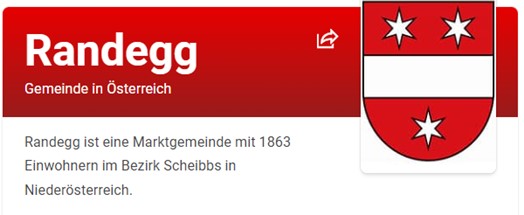STRIDE - Energy communities in practice: The case of Randegg, Lower Austria
21-12-2022


Much has changed for the small rural community of Randegg in Lower Austria within the past year. Instigated by an introductory information meeting in July 2021, Randegg is well on its way toward setting up its first energy community. With a population of under 2000 inhabitants, the community is interested in rendering its energy more sustainable and taking an active role in making its future greener.
The main goal behind the establishment of the energy community is to make its electricity supply more regionally based and sustainable. In addition, local generation capacity is to increase from 850KW to 3600 KW by 2030. An additional aim is to ensure that the electricity being generated locally is bought and sold within the community; the intention of this switch will take some of the strain of the electricity grid and prevent future blackouts.
Various buildings in the community already boast photovoltaic panels, such as the local community pool, the community gym and the community school. These panels – along with others – will ensure that electricity is steadily fed into the energy community. A total of 8 parties from local businesses, state institutions and utilities have expressed interest in joining the community either as prosumers or consumers.
All excess energy produced will be used by consumers within the energy community, while supporting energy efficiency measures will be put in place in order to increase the amount of self-produced energy. At the same time, different storage solutions are being explored to store excess energy and to provide electricity in case of disruptions.
In addition, a contact point is to be set up, which will make it possible to raise awareness in the community surrounding energy topics, with the intention to increase interest in similar projects and initiatives. Economically speaking, the members of the energy community also benefit from selling their electricity to the community. The price control this ensures also helps fight against energy poverty, as prices are kept predictable through locally produced electricity.
Another interesting aspect of this particular case is that sector coupling will be applied, with the district heating systems of both Randegg and Schliefau to be connected to the energy community. These will convert excess electricity produced by the energy community into heat through heating rods or heat pumps. That heat will then be fed into the district heating system, ensuring that the energy is used in the optimal way possible.
